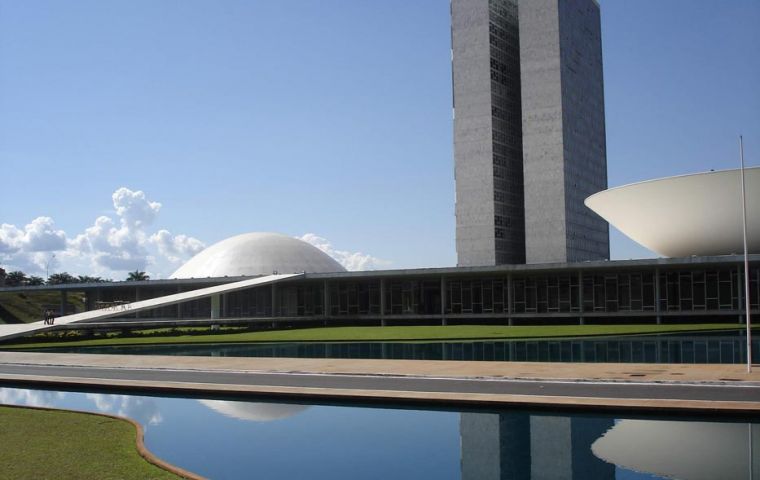MercoPress. South Atlantic News Agency
Brazilian Senate ready to approve Venezuela’s inclusion in Mercosur
 A crucial vote in the Senate coincides with an official visit of Lula da Silva to Venezuela
A crucial vote in the Senate coincides with an official visit of Lula da Silva to Venezuela Strong lobbying from business interests in Brazil and Venezuela apparently will have tipped the balance and open the way for the Brazilian Congress to include Venezuela in South America’s largest trade block, Mercosur when it takes a vote on Thursday.
Brazil’s trade surplus with Venezuela last year rose to 4.6 billion US dollars and the Federation of Venezuela-Brazil Chambers of Commerce and Industry has argued that having Venezuela inside would provide firmer rules governing trade relations with South America’s third- biggest economy.
“I’ve personally visited at least half of the 81 senators already” said Jose Francisco Marcondes, the federation’s president.
The Brazilian Senate International Relations Committee is schedule to vote on the initiative Thursday and will probably go along with President Lula da Silva’s push to admit Venezuela to Mercosur (Brazil, Argentina, Paraguay and Uruguay).
“I think we’ll be defeated in the committee,” Tarso Jereissati, of the opposition Social Democratic Party, said in an interview. If so “we’ll take the fight to the floor where it’s harder for the government and see from there.”
The Mercosur issue has given the opposition an opening to criticize Lula da Silva for his support for Venezuelan President Hugo Chavez. In his report to the committee urging rejection of Venezuela, Senator Jereissati said democratic liberties in the country had eroded with the aim of “keeping President Chavez in power forever.”
Brazil’s sales to Venezuela, the largest oil exporter in Latinamerica, climbed to 5.2 billion USD last year from 706 million USD in 1998, according to Brazil’s Trade Ministry. Odebrecht SA, a Brazilian construction company, has a contract to build a subway and commuter rail in Caracas. Braskem SA, Latinamerica’s biggest petrochemical producer, plans to build two plants in Venezuela.
Of the other Mercosur full members Uruguayan and Argentine lawmakers already approved Venezuela’s incorporation and Paraguayan President Fernando Lugo withdrew his motion in support last month to prevent a loss in Congress, according to Foreign Affairs Minister Hector Lacognata.
Created in 1991 to promote free trade and the free movement of people and currency, the bloc’s leaders agreed July 4, 2006, to invite Venezuela to join.
Less than a year later, Brazilian lawmakers criticized Chavez for refusing to renew the broadcast license of Radio Caracas Television, then Venezuela’s most-watched network. Chavez, in turn, called the Brazilian lawmakers “parrots” of Washington.
In August, Chavez closed 32 radio stations and two television broadcasters, saying the government might move against another 285 outlets. But President Lula da Silva has repeatedly defended Chavez’s tactics.
“I’ve often been criticized in Brazil for defending the process here in Venezuela, because I know how many elections you have submitted yourself to, how many referendums, polls, and I think this is the exercise of democracy” Lula da Silva told Chavez in Maracaibo.
This week however Lula da Silva returns to Venezuela to showcase how regional integration promotes Brazilian commercial interests. In Caracas, he’ll inaugurate the first branch of state-run Caixa Economica Federal and visit a farm where Brazilian-developed technology is being used to harvest soy in Venezuela for the first time. He and Chavez will also sign an investment accord for a joint refinery project between state-owned Petroleos de Venezuela, PDVSA and Petrobras.
“The government of Venezuela doesn’t fulfil Mercosur democratic clause” has repeatedly stated Brazil’s former president Jose Sarney and a Lula da Silva ally and leader of the Senate. Sarney, as president, signed the 1985 treaty that laid the ground for Mercosur.
The head of the government coalition in the Senate, Romero Juca, foresees a close vote, but said he’s confident Venezuela’s membership will be approved.
“If there’s lack of democracy in Venezuela, as the opposition argues, then it’s one more reason to include the country -- to add some transparency. Dictatorships don’t relate with democratic nations,” Juca said.
Caracas Mayor Antonio Ledezma, a leading opponent of Chavez in Venezuela, told the committee he supports Venezuela’s integration into the trade bloc.
“Chavez is more dangerous to the region if he’s isolated from democratic nations,” Ledezma said after listing what he said were authoritarian actions by Chavez that included redrawing the map of Caracas after Ledezma won the mayor’s race.
Exclusion from Mercosur would cost Chavez more politically than in trade, tarnishing his regime’s legitimacy and lending support to critics who say he has suppressed the media, manipulated elections and controlled the courts, said Rubens Barbosa, Brazil’s former ambassador to the United States.




Top Comments
Disclaimer & comment rulesCommenting for this story is now closed.
If you have a Facebook account, become a fan and comment on our Facebook Page!